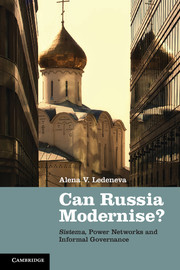Book contents
- Frontmatter
- Contents
- List of figures
- List of tables
- List of boxes
- Acknowledgements
- List of abbreviations and acronyms
- Introduction: modernising sistema
- 1 What is sistema?
- 2 Putin's sistema: svoi on top
- 3 The inner workings of sistema: from blat to otkat
- 4 Sistema's material culture: from vertushka to Vertu
- 5 ‘Telephone justice’ in the global age: from commands to signals
- 6 ‘Werewolves in epaulets’: from doublethink to doubledeed
- 7 From dealership to leadership: sistema and informal governance
- Conclusion
- Appendix 1 Survey questions
- Appendix 2 Interview questions
- Appendix 3 List of interviews
- Glossary
- Bibliography
- Index
Appendix 2 - Interview questions
Published online by Cambridge University Press: 05 February 2013
- Frontmatter
- Contents
- List of figures
- List of tables
- List of boxes
- Acknowledgements
- List of abbreviations and acronyms
- Introduction: modernising sistema
- 1 What is sistema?
- 2 Putin's sistema: svoi on top
- 3 The inner workings of sistema: from blat to otkat
- 4 Sistema's material culture: from vertushka to Vertu
- 5 ‘Telephone justice’ in the global age: from commands to signals
- 6 ‘Werewolves in epaulets’: from doublethink to doubledeed
- 7 From dealership to leadership: sistema and informal governance
- Conclusion
- Appendix 1 Survey questions
- Appendix 2 Interview questions
- Appendix 3 List of interviews
- Glossary
- Bibliography
- Index
Summary
1 On the workings of informal power and sistema
I am interested in everything related to informal relationships within power elites and informal power. How would you define informal power?
How does it relate to formal power?
How can one recognise the existence of informal power? What are its signalling factors?
What did you know about informal power relationships before you took up your current position?
How does informal power work: vertically or horizontally?
Is it possible to escape templates and analogies with formal power when thinking about informal power?
What are the sticks and the carrots of informal power? What constitutes its pressure?
What are the indicators of informal power? Is it possible to measure it? How?
Why do people comply with informal requests that often come as oral commands?
Why are people pressed to play by rules that deviate from the law?
Why is it not possible just to live by the law?
What is sistema (the system)? How would you define it? Do your remember your first encounter with sistema?
Is it possible to get out of the system? What kinds of problems arise? Why?
Cynicism and lawlessness lead to the strengthening of authorities. Is dictatorship inevitable?
What is your first memory of sistema? Was it personal? What would explain your situation?
Kinship, access to powerful patron, network, loyalty to the boss – who needs this? The patron, the client, the intermediary? The system?
2 Questions on informal power and clans
Does it make sense to talk about ‘clan politics’?
Why can members of one ‘clan’ be seen in a different ‘clan’?
What does this tell us about the openness and closeness of power networks?
In which sense are they open? (describe specifics of recruitment, ‘parachuted’ appointments)
In which sense are they closed? What is the role of birthday celebrations in sistema? Do you always see the same people at all birthday parties? How would you define the difference in the circle of those invited?
What is a ‘korporativnyi chelovek’ (corporate person) in your view? Is it an insider of a certain network or clan, or simply the one who knows how to behave (to go on under certain circumstances) and displays mastery of unwritten rules of the system?
Would you say that ‘corporate people’ tend to be more successful with their careers?
Do you know of any ‘non-corporate man’ who has been appointed or promoted?
- Type
- Chapter
- Information
- Can Russia Modernise?Sistema, Power Networks and Informal Governance, pp. 263 - 270Publisher: Cambridge University PressPrint publication year: 2013



